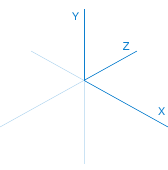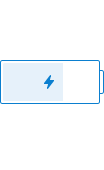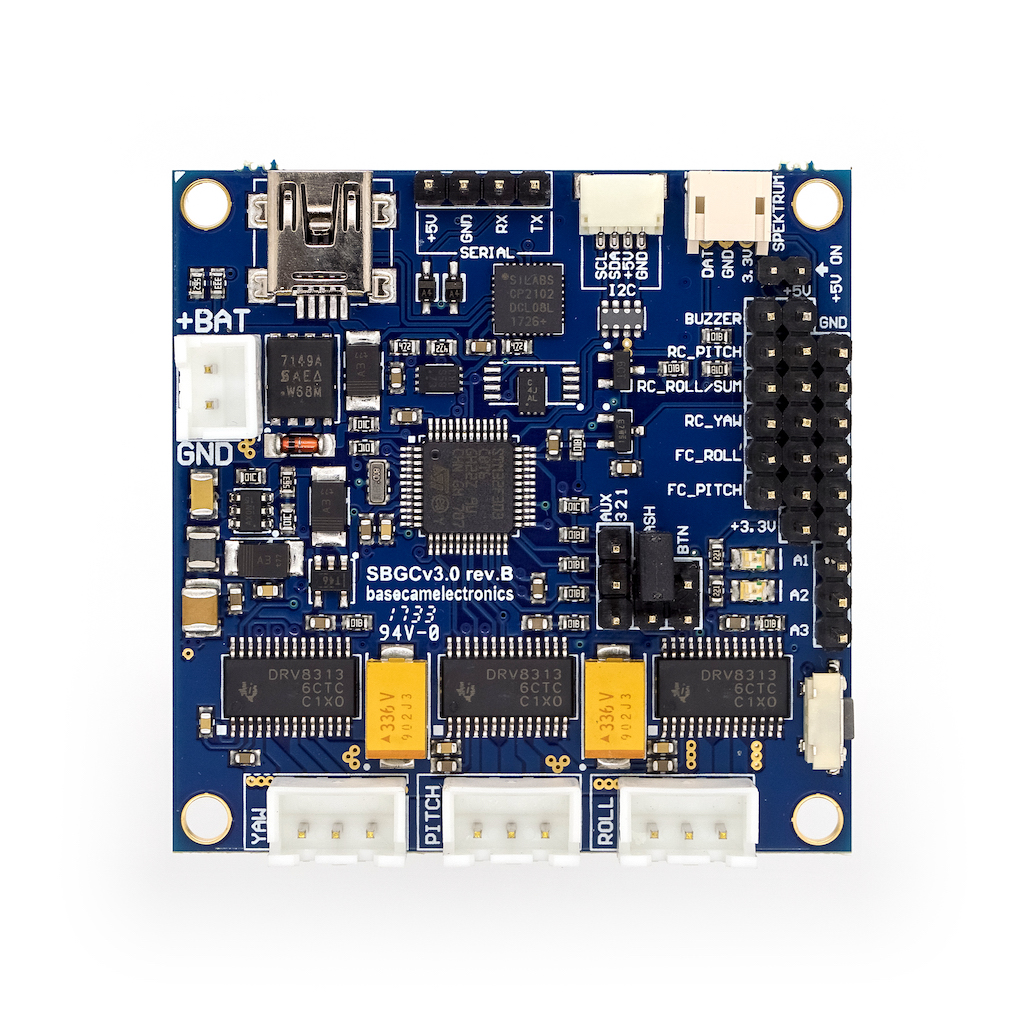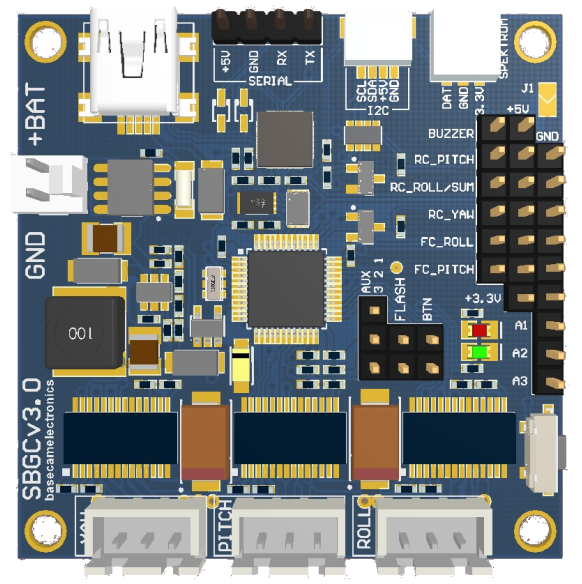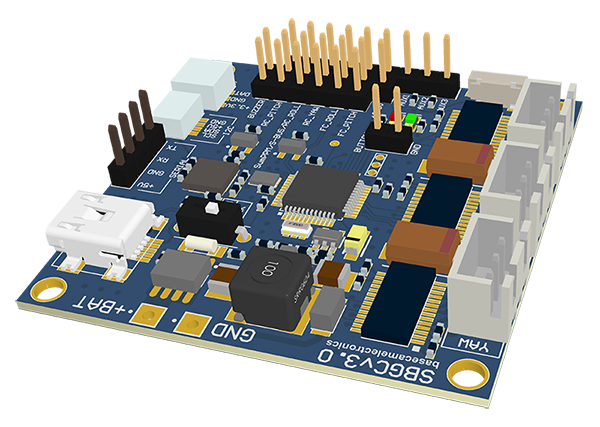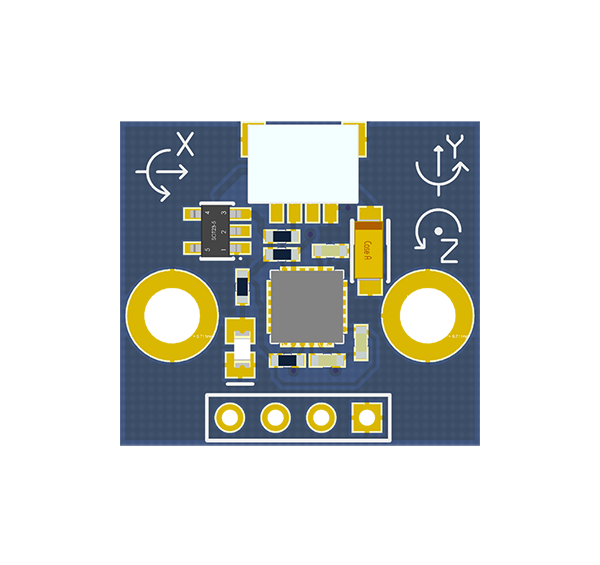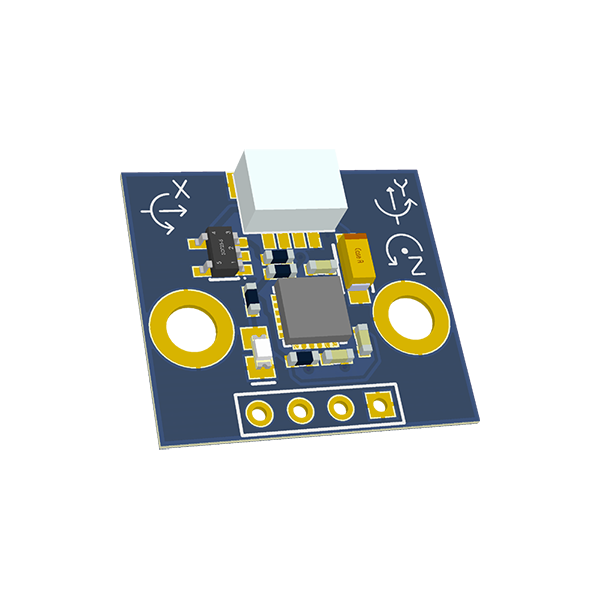BaseCam SimpleBGC32 "Regular" Controller
The BaseCam SimpleBGC 32-bit controller is used for the construction of high-quality 3-axis camera stabilizing systems. This board is deployed in handheld and
This version of the controller (and the new Tiny 32-bit board) is our new direction in the development of stabilizing solutions. It replaces the previous 8-bit version of the SimpleBGC controller keeping 100% backward compatibility for users replacing an older controller with this one who needs all of the functionality of the old controller to be the same in the new controller (in order to fit into the existing system with a minimum of effort). In addition, the management software is backward compatible, so it is possible (or likely) that users of older 8-bit controllers are using the newest version of the management software.
For bulk orders please contact us at info@basecamelectronics.com
Capabilities
- Possibility to manage the system on different platforms
- Desktop systems: Windows, macOS, Linux. The firmware of the controller is user-upgradeable (through the GUI).
- Smartphones: Android and some control from 3rd party vendors for Apple's iOS and iPadOS products (iPhone and iPad).
- Open Serial API
- Open programming interface for the development of external control modules — both for software configuration and control of the board and for communication with various electronic devices.
- Automatic tuning of PID parameters
- Allows you to quickly prepare the system for work either at the initial settings or at changed conditions.
- Support of systems with various hardware configurations
- Flexible customization of the sensor orientation.
- Support for a wide range of motors of various configurations and sizes.
- Support several configurations of motor orders, including configurations with the tilted motor axes.
- Support for two IMU sensors and external IMU for maximum precision
- The system works with either one or two IMU sensors. The use of two sensors improves stability and accuracy in the
non-encoder version. - Optional connection of a
high-grade external IMU sensor orMavLink-enabled auto-pilot extends precision for demanding applications. - Support for a wide range of absolute encoders
- Installing an encoder on each motor greately improves system performance and extends the range of applications.
- Different algorithms of follow mode
- Flexible configuration of the following mode for each axis. Automatic switching of horizon axis mode from lock to follow in case of persistent camera tilt.
- Up to five user-configurable modes of system operation selectable with a toggle button
- 5 profiles grouped in 5 profile sets allows changing modes of operation or even hardware configurations
on-the-fly . - Support of a wide range of external control protocols
- Futaba, Spektrum, 5x PWM, Sum-PPM, 3 ADC, Serial API
- Flexible configuration allows for control of any functions of the system (every parameter that the system uses is configurable).
- Battery voltage drop compensation
- This ensures proper control of the drive motors during the whole life of the battery.
- Different versions of the controllers for different needs
- The licensing system allowed our partners to launch different versions of controllers for a wide range of applications: from compact controllers for stabilizers of light cameras to powerful ones for the stabilization of heavy units.
- Ongoing work to improve the system
- BaseCam Electronics is working closely with the developers of end devices, which allows us, on the basis of feedback, to continuously improve the stabilization algorithms and expand the capabilities of the system within a single version of the controller.
Dimensions, mm
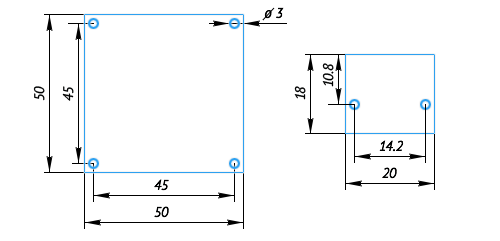
Rev. B Features
- Protection FET handles more current
- Better current distribution
/!\ Rev. A Important Notes
A. Some versions of this board may have minor error in labeling outputs: On boards having the
B. Some versions of the controllers can have a problem with the spektrum port: satellite receiver does not get enough power from the 3.3V internal voltage regulator, and it may function incorrectly (simptoms: signal interrupts, LED blinks randomly, on binding attempt system goes to reset). Possible workarounds:
- Power the receiver from an external 3.3v power source (preferably a regulated battery supply).
- To solder additional 3.3v LDO regulator into the controller. The best choice is 3-lead TO-92 package (for example, LP2950-33, L4931CZ33-AP, L78L33-ACZ). Soldering additional LDO voltage regulator 3.3v
Specifications
| Rev. A | Rev. B | |
|---|---|---|
| Size of the board | 50×50 mm | |
| Weight | 16.71 g | |
| Distance between the mounting holes | 45 mm | |
| Diameter of the mounting holes | 3 mm | |
| Power supply voltage | 8–25 V (3s-5s LiPo) |
8–26 V (3s-6s LiPo) |
| Maximum motor current | 1,5 A* | 1,5 A* |
| 5V output current to power external devices | up to 1 A | |
| 3V output current | — | 50 mA |
* Maximum motor current 1,5 A — total current for three motors.
For example, one motor can take 1 A, two other 250 mA each — but the total current should be no more than 1.5A.
Downloads
USB Drivers for PC Connection
If controller being connected to the USB port, is not recognized as COM-port, most probably you need to install or update drivers for CP210x chip. You can download driver for your OS from the manufacturer of CP210x.
AN IMPORTANT NOTE: The latest version (6.7.4) of driver for Windows may cause problems with delay in data transmission, visible as a big lag of the GUI. In this case, install version 6.7.2 of the driver, which had no such problems.
Support
Type your question or comment below. Answer will be sent at your E-mail within 24 hours on workdays.


